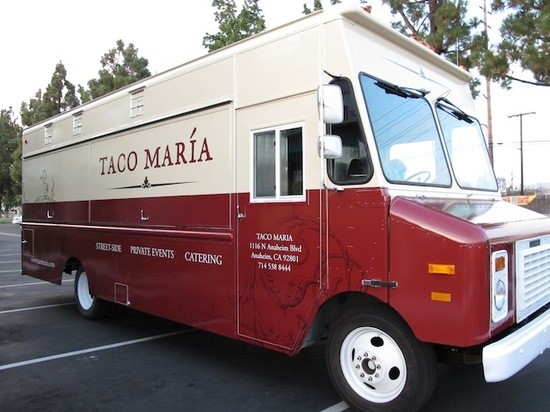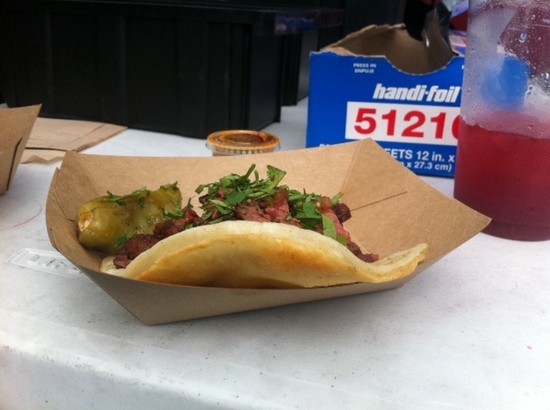
Today is the last day to contribute to the Kickstarter campaign for Taco Maria, and while we're usually loathe to promote any, we'll make an exception here. As we've written many times before, chef Carlos Salgado is not only an OC boy, but his food is spectacular, and the mouth waters and the possibilities he'll finally be able to achieve at his coming restaurant at the OC Mix.
But instead of a mere plug, we also asked Carlos to contribute an essay (TINSTAAFP–there is no such thing as a free plug haha) on his experience at Mesamerica 2013, the epic Mexico City event that Clay Oven chef Geeta Bansal has been documenting for the past couple of months. Anyhoo, here's Carlos' essay–and one more time, the link to the Kickstarter campaign. Now give, damn you: GIVE!!!
]
Mesamerica 2013
By Carlos Salgado, Taco Maria executive chef/owner
In Mexico's Distrito Federal, in an auditorium bounded on all sides by street vendors, food stalls, and commuting citizens of the country's capitol, many of the world's greatest chefs and food minds came together this past May 20-22 at Mesamerica 2013. Outside, the locals prepared to serve tacos al pastor, blue corn quesadillas de huitlacoche, and sopes topped with creamy escamoles. Trays of guisados filled the air with delicious vapor and, inside, the vanguards of world cuisine prepared to celebrate the country's global influence and the present potencia of its food traditions.
Curated by Enrique Olvera, Chef of Pujol and godfather to Mexico's contemporary chefs and restaurants, the Mesamerica conference attempts no less than to encompass the whole of the modern Mexican condition. In its second year, a congress of progressive chefs, artisan producers, writers, and social activists were engaged in a multidisciplinary conversation meant to inspire the country's young and restless generation of chefs – and perhaps every common citizen. Presenters spoke to the quality of Mexico's ingredients and the creativity of its techniques, about its enviable agriculture and biodiversity, and on the social and political implications of the country's food revolution. Among the thousands of eager culinary students lined-up outside, there was a powerful sense of being part of something enormously important. And for a young, Mexican-American chef like me, their energy and pride was infectious; I couldn't help but feel, in that moment, that my mother's Mexico was at the center of the culinary universe.
I was born in LA of Mexican immigrants and raised in a hole-in-the-wall taqueria in OC. My parents supported us on profits from enchilada combo plates and carne asada burritos – best-sellers in the middle-class and mostly white neighborhood in Orange where they set-up shop decades ago, not far from where my grandfathers had worked as braceros at the tail-end of Orange County's citrus-packing era. They measured the cost of living in crispy tacos: “Do you know how many tacos I have to sell to buy a new TV?” Like so many immigrants, Mom and Dad relied on their native foods to make a living in a new country. And like immigrants of so many other cultures, my parents altered traditional dishes to appeal to Americans, until they spoke only faintly of the flavors and identity they had brought from Mexico.

Carlo Petrini, legendary founder of the Slow Food Movement, opened the conference with a powerful imperative; relevant to young Mexicans as it is to young people anywhere. His impassioned plea to the students in the audience: to respect and maintain their cultural identity and reject the destructive forces of fast and manufactured foods – to look inward, even backwards, for inspiration. In a kind of Spanish-Italian, he observed that “right now Mexico and its cooks are at the precipice of a fundamental idea” … “that food is everything,” and that “every aspect of society” stands to be changed by culinary forces. Rene Redzepi, of Denmark's Noma, told the story of how Mexico City and the taco al pastor changed his life, and why they should allow food to change them. My friend David Kinch, chef and owner of Manresa, conveyed his respect for the country's ingredients and was moved by a beautiful foie gras from Jalisco – my mother's home state – which we prepared the night before. Others served creative manifestos, shared surveys of Mexico's edible history or delivered dissertations on pork, entomophagy, and the deeper meaning of birria.
Organic farming, heirloom seeds and breeds, seasonal and sustainable cooking – these are parts of Mexico's history. Deep flavors and native foods are the country's culinary identity. Meanwhile, too much Mexican food in the US comes from a monoculture of ingredients: CFO meats, GMO tomato, avocado, iceberg lettuce and processed cheese. Southern California may well have the best Mexican food outside of Mexico, with an incredible diversity of styles from every region, new-wave taco trucks, old-school loncheras, our rarities, gems, and great locally-grown chains. But our mainstream American Mexican food can often times seem culturally orphaned. As the larger culinary world of chefs, travelers, and food writers begin paying closer attention to the source, it's exciting to think of how Mexican cuisine in California – and here in OC – will progress. What happens in Mexico matters here.
Beyond the impact it may have on Mexican food locally, Mesamerica 2013 also represents a moment in a proud cultural tide for Mexican natives and descendants, even here in Alta California where we have struggled to find a common and positive identity, even as we've become Southern California's majority ethnic group. When I think of my parents, or of the millions of Latinos hard at work in kitchens or on farms across the US, I begin to hope that Mexican food can change us. If we look South and Forward, we can see that our common ancestral cuisine is richer and more complex than we remember, and that it is now one of the most progressive, creative, and sought-after food cultures on the planet.
Carlos Salgado is the executive chef and co-owner of Taco Maria, a luxe lonchera that's turning into a restaurant of the same name. To contribute to Taco Maria's Kickstarter campaign, click on this link
Follow Stick a Fork in It on Twitter @ocweeklyfood or on Facebook!

